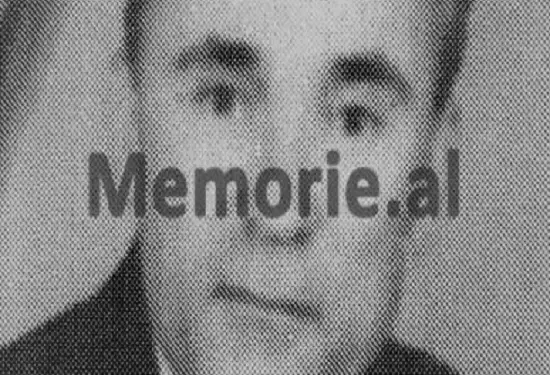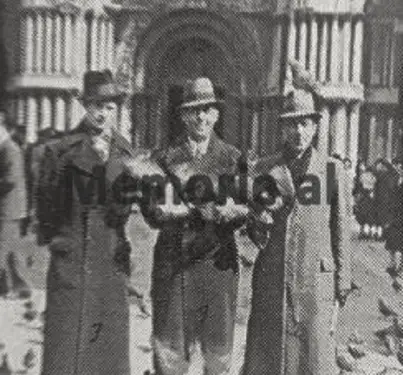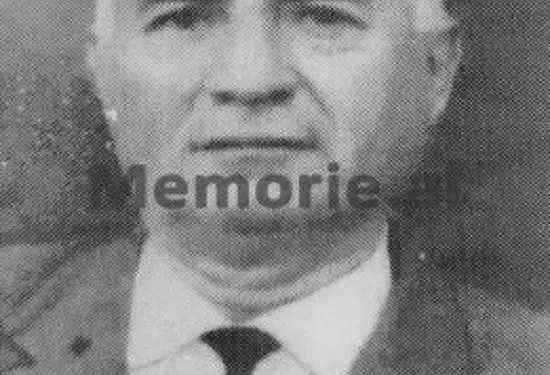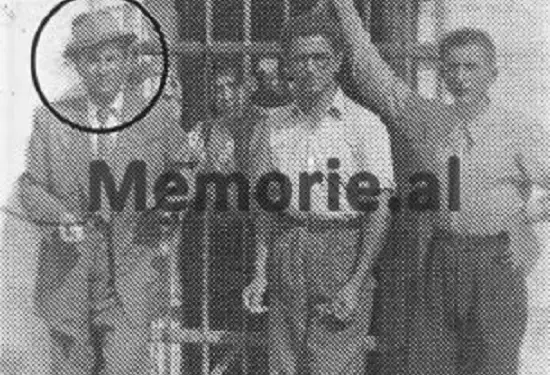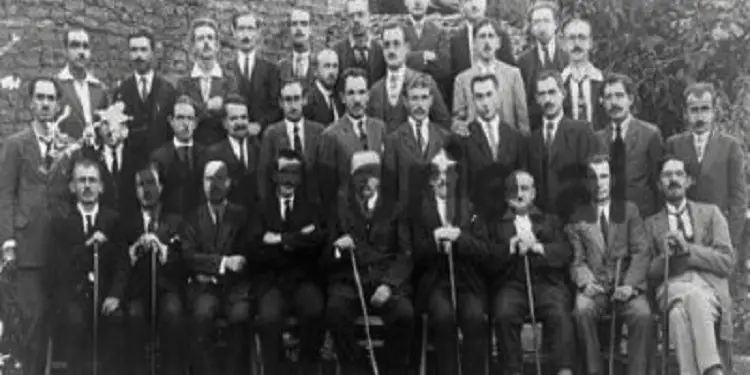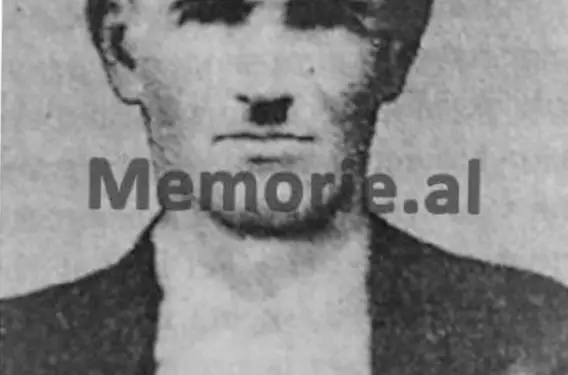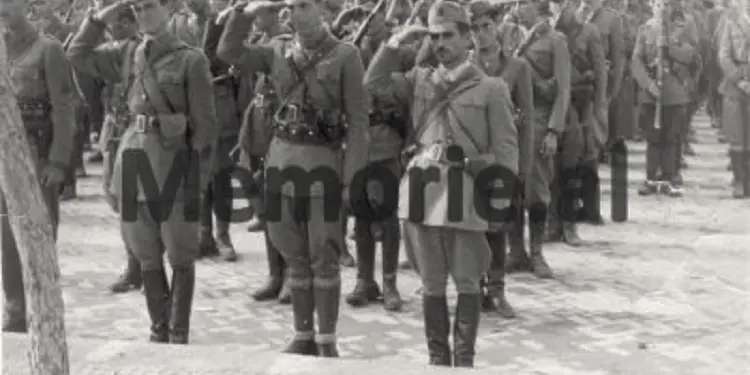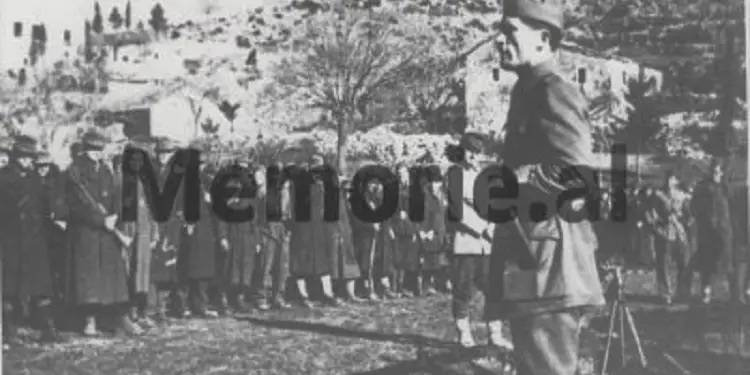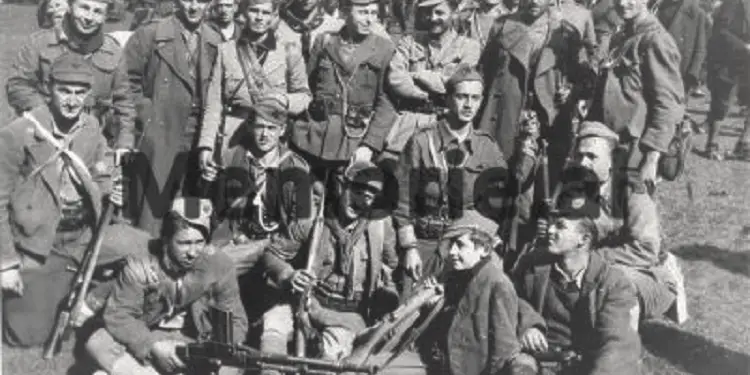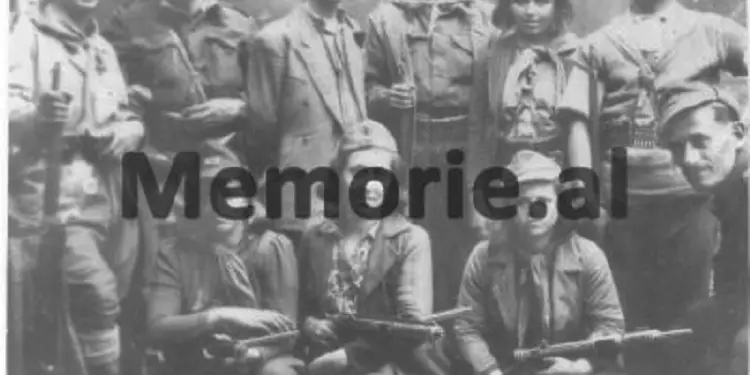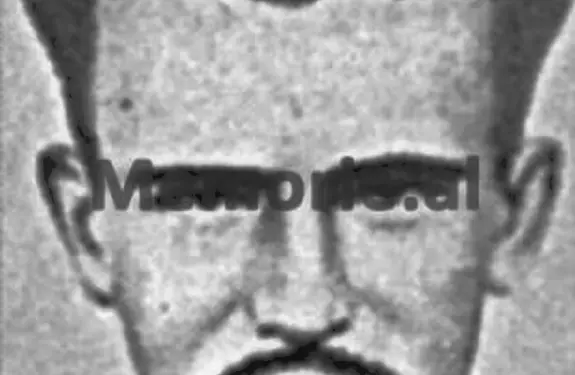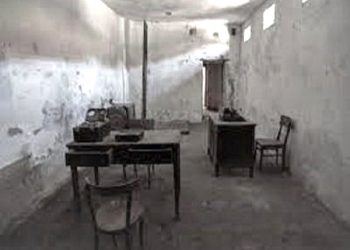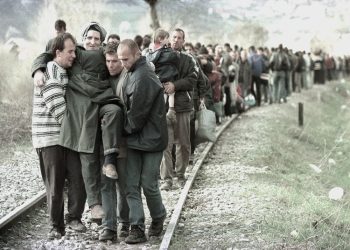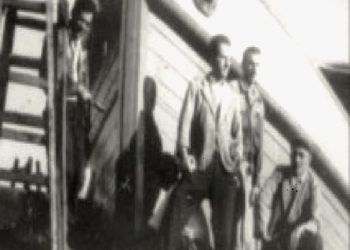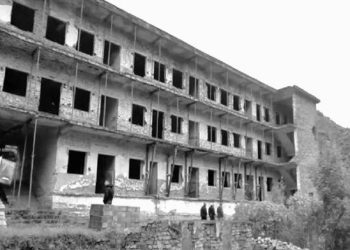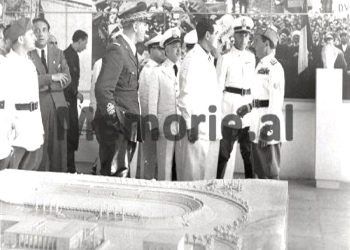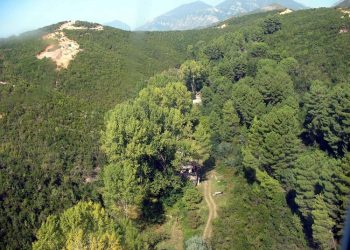Dashnor Kaloçi
Memorie.al publishes the unknown story of the Libohova family originating from the town of the same name in the South of Albania and living in Lushnja since the period of the Zog Monarchy, which after 1944, was separated “in two” by the communist regime of Enver Hoxha who has just come to power. Testimony of Gëzim Libohova, the former partisan of the First Assault Brigade of Mehmet Shehu and after the War as director of the Professional Variety of Lushnja district, for his family, where his two brothers, Skënderi and Aqif, who were killed in the war proclaimed “Martyrs of the Fatherland” and were honored as such, their father, Tekiu, with his eldest son, Rexhaiu, were sentenced to political imprisonment, being labeled “enemies of the people.
After the end of the war, our family, which was all connected with the Anti-Fascist Movement, had a somewhat special “luck”. While my two brothers, Aqifi and Skënder, who had been partisans and were killed in the war, were declared “Martyrs of the Fatherland”, our father Tekiu, along with his older brother, Rexhaiu, were arrested and convicted as enemies of the people. “. Based on this, every May 5, “Martyrs’ Day”, the official authorities of the district of Lushnja, come to visit only my family to honor the memory of two brothers, Aqif and Skënder, while our elder brother, Rexhaiu, who had the house just a few steps away, no one ever stepped on it. ” This is how Gëzim Libohova, a former partisan of Mehmet Shehu’s First Assault Brigade during the Nazi-fascist occupation of Albania and later a teacher and director of the Professional Stage of the city of Lushnja, recalled the tragic history of his family; where two brothers were killed in the war, while his father, Teki Libohova, and older brother, Rexhaiu, were arrested and imprisoned by the communist regime as “enemies of the people.” What is the past of the Libohova family, how did they connect with the Anti-Fascist Movement, and what was their contribution to that war? Why were Teki Libohova and his eldest son, Rexhaiu, sentenced to death during the years of Enver Hoxha’s communist regime for the terrible class war, and why was Skënder and Aqif never awarded the high title “People’s Hero”? Regarding these and other events and facts from the painful history of the famous Libohova family originating from the town of the same name in southern Albania, we know the testimony of Gëzim Libohova, the brother of the two “Martyrs of the Fatherland” and two enemies of the people”.
Who was Rexhai Libohova
Who was Rexhai Libohova, where was he educated, and what was his past during the years of the Monarchy? In this regard, his brother Gëzimi testified: “Rexhaiu, who was also our older brother, was born on May 27, 1912 in the city of Lushnja and being the eldest son of the family, he grew up under the care of our grandmother. , Nysiet, who always stood by him. During the days when the Congress of Lushnja was taking place, in January 1920, some of the delegates of that famous meeting who were friends of our father, took Rexhai, 8 years old, inside the house where the Congress was taking place, and since then we have kept one pictures they took with him. In 1922, when the French senator, Justin Godart, paid a visit to the Lushnja Women’s School, little Rexhaiu came forward, welcoming her without ordering anyone. The French friend was surprised by that gesture and then begged our grandfather, Khalid Efenfiu, to take Rexhai and educate him under his care in France. Grandpa initially agreed, but then, seeing our grandmother’s concern, the next day he told Godart that he could not give the boy to him, as he found it difficult to separate him from his grandmother. After Rexhaiu finished primary school in the city of Lushnja, pleased with his results, our father, Tekiu, decided to send him to study in Italy. So in 1928, he enrolled at Monte Maria International College in Rome (a three-year school), which he graduated within 1930. After that, Rexhaiu returned to Albania and his father sent him to the city of Vlora to continue his studies at the School of Commerce, which he completed with excellent results in 1933. After that, at the insistence of some relatives of the family. Our father sent Rexhai to Thessaloniki, Greece, where he studied at the Italian Institute of Commerce in that city, where he graduated in Finance. After returning to Albania, he won a competition and was given the right to work as a financial secretary-consultant in the Chamber of Commerce of the city of Elbasan. In this city, Rexhaiu met and married the daughter of Shefqet Daiu (Ikbalen), who had served as secretary of Ismail Qemali and in 1912, had signed with his own hand the act of the Declaration of Independence in the Ottoman language. Although Rexhaiu worked in the Chamber of Commerce of that city, during the period of Zog’s Monarchy, he followed the political developments in the country with great attention. For this he was also encouraged by our uncle, Dr. Mustafa Libohova, who was well known in the political circles of the time, had run for parliament in 1923 with the opposition group led by Fan Noli. During those years, Rexhaiu spent most of his time dealing with his professional activity in the Chamber of Commerce and at home reading various books from our rich library, which he had created himself “, he recalled. Gëzim Libohova for his older brother Rexhaiu, who after being educated in Finance in Italy and Greece, during the period of the Bird Monarchy, served as a consulting secretary for Finance in the Chamber of Commerce of Elbasan and Lushnja.
Rexhai’s arrest by the Italians
What was Rexhaiu’s activity during the years of the Nazi-fascist occupation of Albania and why did he not join the partisan brigades, like the other three younger brothers, Aqifi, Skënderi and Gëzimi? In this regard, Gëzim Libohova testified: “After the occupation of Albania by fascist Italy, Rexhaiu was one of those who, after April 7, 1939, openly opposed fascist aggression and doctrine, and as a result, he was included in the lists of those the people the Italians decided to deport to Italy. After being deported to Italy in 1940, he was sent to continue his training at the Officers’ School in Spoleto. Since Rexhai had no desire to become an officer, the school command excluded her from the ranks with motivation; “For disability.” After that, Rexhai returned to Albania and settled again in the city of Elbasan, where his wife, Ikbalia, was waiting for him. At that time in Elbasan, the “Normal” school and our other brother, Skënderi, were continuing their schooling, and they were so closely connected that they did not do anything without both of them falling into one mind. From the beginning of 1941, Rexhaiu became closely associated with the anti-fascist circles operating in Elbasan, and as a result, on November 7, 1941, he was arrested by the Italians and sent to Tirana prison. The Supreme Military Court sentenced him to three years in prison for his anti-fascist activity (indictment No. 4337/3435 R.S.) and after being held in the Tirana prison until May 1942, he was transferred from there to the Elbasan prison. Rexhaiu remained in that prison until November 1942, when he was released on the occasion of an amnesty in honor of Flag Day. While Rexhaiu was serving his sentence in the Elbasan prison in April 1942, his daughter Elisabeta was born to him, and his mother, Ikbalja, took him to see him behind bars. In December 1942, Enver Hoxha went to Rexhaiu’s house in Elbasan, which was very close to Tomorr Sinani’s, and met with him. After wishing him release from prison, Enver called on Rexhai to join the ranks of the National Liberation Front and recommended that he go to the city of Lushnja, where our parents’ family was staying. Rexhaiu gladly agreed to join the Front, but he refused to come to Lushnja, telling Enver that he was in danger there, as he had all three brothers connected to the War. Although Enver did not oppose it and after that, they parted amicably, that skeptical attitude would cost Rexhai hard “, recalled Gëzim Libohova for his brother Rexhaiu, who after the meeting with Enver Hoxha became closely connected with the Anti-Fascist Movement, giving a great moral and material contribution.
Political imprisonment of Teki and Rexhai
Although there at the end of 1944, the two sons of the Libohova family, Gëzimi and Skënderi, were partisans and the other brother Aqifi was killed in the war, their father, Tekiu, and his eldest son Rexhaiu were arrested by the communists. In this regard, Gëzim Libohova testified: “Our father Tekiu was arrested by the communists as a” suspicious “man on November 5, 1944 (by order No. 431) signed by the Chief of General Staff of the Army and after detained for some time, learned that he was the father of three partisans and was released. Similarly, a few months later, at the beginning of 1945, Rexhaiu was arrested, who had made a great contribution to the War, no less than the other three brothers. He was brought before the Special Court for “War Crimes”, being accused of being the main cause for the discovery of the National Liberation Council of Elbasan and the arrest of Tomorr Sinani. Although both of those absurd allegations were refuted and rejected by Tomorr Sinani’s own mother, the respected teacher Hysen Dylgjeri, Rexhaiu, was sentenced to five years in prison, which he suffered in the Maliq and Vloçisht camps. He was released in May 1949, and when he returned home, he found his father morally and spiritually murdered by the communists’ attitude toward our family, who had given the blood of two brothers in the war. In the years that followed, the communist regime fell into “trouble” with our family, and did not know how to call us: “Declassed families” or “Families of martyrs” ?! However, the “solution” was found and every May 5, which was “Martyrs’ Day”, the high authorities of the Lushnja district came to visit only my house, since I had been a partisan, to honor the memory of Aqif and Skënder. and in Rexhaiu, who lived only a few steps away, no one ever stepped on it “, concluded his story, Gëzim Libohova, the brother of the two Martyrs of the Fatherland and at the same time the son and brother of the two “enemies of the people”.
The family of Teki Libohova, the friend of the French senator, Justin Godart
The origin of the Teki Libohova family, or as it is otherwise known by the surname Ismailati, is from the southern town of Libohova in Gjirokastra, from which they have inherited their surname. Teki’s father, who is also the grandfather of the five Libohova brothers, was named Halit, while his mother, Nysieti, was from the famous Kumbaro tribe, also from Libohova. Halit Libohova had completed his higher education and graduated in Jurisprudence in the capital of the Ottoman Empire, Istanbul. After graduating, Halit Zenel Efendiu, as he was called out of respect, returned to Albania in 1853 and was appointed Kadi (judge) in the Prefecture of Berat, where he worked for several years. Tekiu’s wife was named Hedije and was the daughter of Elmaz Mustafaraj from Kanina, Vlora, one of the most famous families in the province, known for her contribution and participation in the wars that led to Albania’s Declaration of Independence on the 28th. November 1912. Teki Bey Libohova was one of the closest friends of the politician and friend of Albania, the French senator, Justin Goyard, as well as the great patriot Aqif Pasha of Elbasan. Teki Libohova had such a close friendship with Aqif Pasha that he named his second son, after him, Aqif. Around 1903, for economic reasons, the Libohova family (Ismailati) moved from the town of Libohova and settled in the small town of Lushnja in the heart of Myzeqe and its fertile fields. Teki Libohova and his wife Hedie Mustafaraj had eight children, the first of whom was Rexhaiu, who was born in 1912. He was followed by Aqifi, (1914) Merzija, (1916) Skënderi, (1920) Fatbardha, ( 1926) Gëzimi, (1928) Fatosi (1930) and Liljana, (1934). During the period of occupation of Albania, in 1939-’44, the whole family of Teki Libohova became closely associated with the Anti-Fascist Movement and three of her sons: Aqifi, Skënderi and Fatosi, joined the ranks of partisan brigades, while Tekiu himself and his eldest son Rexhaiu, although not a partisan, made a major contribution to that war. While after 1944, Aqifi and Skënder who were killed in the war were declared “Martyrs of the Fatherland” and their remains were placed in the Martyrs’ Cemetery, their father, Tekiu, with his eldest son Rexhaiu, were arrested and sentenced to prison. politically labeled as “enemies of the people”.
Skenderi was killed in Visegrad, Bosnia, and Aqifi in Skrapar
Aqif Libohova, who was also the second son of the family, after graduating from high school in the early 1930s, became active as a player and coach with the football team “Lushnja Congress”. During the war years, he took an active part with the guerrilla units of the city of Lushnja, and for his anti-fascist activity, he was arrested by the Italians together with his older brother Rexhai. Aqifi was held in Tirana prison until April 1942 and was later released for lack of evidence. He then became a partisan with the Myzeqe group and was killed fighting against the Germans on Mount Ostrovica in the Skrapar district. Skënderi, who was also the third of five brothers from the Libohova family, after finishing primary school in his hometown of Lushnja, continued his studies at the “Normal” in Elbasan, where he became closely associated with the communist-anti-fascist movement. As early as May 1942, he took an active part in the guerrilla unit of the city of Lushnja, and as a result, the Italian authorities described him as a high-risk person and instigator of riots. After that, an order was issued for Skënder by the Ministry of Education, where he was expelled from the Vlora School of Commerce (where he had gone after graduating from the “Normal” in Elbasan) and from all schools in Albania. Based on this, he left the city of Lushnja, and in December 1942, he joined the first partisan detachment of Myzeqe. On January 26, 1943, Skenderi took part and was the main organizer of the great anti-fascist demonstration that took place in the city of Lushnja, where he delivered a speech in front of all the people who had gathered in that protest and as a result, he was proclaimed. wanted a person by Italian authorities. In April 1943, Skënderi was appointed Commissioner of the Myzeqe Partisan Battalion, where he distinguished himself as an able organizer and leader in the fighting carried out by that partisan formation. A few months later, he was sent to the Partisan Group in the Shpirag region of Berat, and in March 1944, he was appointed Commander of the First Battalion in the Seventh Partisan Brigade, which was formed in the village of Vlushë. Skrapar, with commander, Gjin Markun. Skenderi took part in all the battles fought by the Seventh Brigade, such as in Gesic and Shpal of Mirdita and even outside the state borders, Montenegro and Bosnia and Herzegovina, traversing its entire route, although wounded seven times in the body… Skënder Libohova was killed on December 16, 1944, while fighting hand to hand with German forces at the Medun Castle in Montenegro. Both Skënderi and Aqifi were nominated several times to be given the high title “People’s Hero”, but that was never possible, because their father Tekiu and older brother, Rexhaiu, were convicted as enemies of the people./Memorie.al




